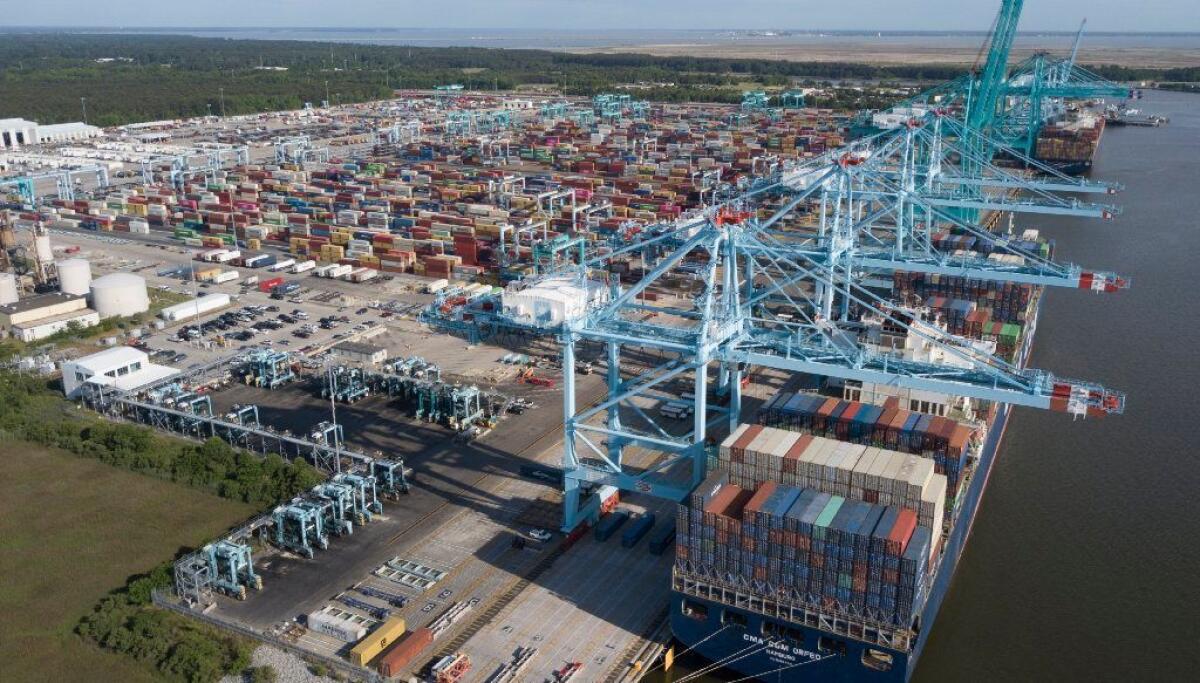No, President Trump, China isn’t paying the bill for your tariffs

- Share via
Tariffs on $200 billion worth of Chinese imports went up 150% Friday morning as President Trump sought to increase pressure on Chinese leaders to cut a more favorable trade deal. The higher tariffs will apply to new shipments from China, not products already en route or in U.S. inventories, so the effects won’t be felt immediately. But they will be felt.
Most of the Chinese products targeted by these tariffs are purchased by businesses, not consumers (for example, automobile components and telecommunications equipment), and at the initial level of 10%, some of the cost may have been absorbed by the suppliers rather than being passed on to consumers. At the new level of 25%, however, consumers are going to wind up covering much more of the cost.
Meanwhile, the Trump administration is preparing to slap 25% tariffs on the $325 billion in Chinese goods not currently subject to tariffs, most of which are bought by consumers, not businesses. So there’s no question who will be paying those levies.
Well, no question in the mind of anyone who understands the basics of how tariffs are imposed and collected. But Trump continues to cling to the fantasy that the tariffs are being paid by the Chinese, and that the money rolling into the Treasury is coming from someone other than his constituents.
The “massive payments” are more like a river of nickels flowing from the U.S. border to Washington. When a shipment arrives at a U.S. port of entry, Customs and Border Protection agents collect any applicable tariffs from the U.S. buyer, typically as a percentage of the purchase price.
Unless China agrees to a trade deal that changes Trump’s plans, the aforementioned river of nickels will soon swell to more than $100 billion in tariffs just on Chinese goods. Trump tweeted that he would use some of that haul to buy food from U.S. farmers whose exports are slumping in the face of retaliatory Chinese tariffs, then send the food to “starving nations” overseas.
Sounds great, right? “Money for nothing and your chicks for free,” as Mark Knopfler might sing. But what Trump isn’t telling you is that he would be doing all these great things by raising Americans’ taxes $100 billion a year. Because that’s what tariffs are — taxes on Americans. No amount of presidential tweeting can change that.
And like other taxes, tariffs take a toll on the economy.
As I argued earlier this week, Trump is fighting the good fight in trying to rein in China’s abusive trade practices and its theft of intellectual property. Tariffs are a blunt instrument with lots of bad side effects, but they do give him leverage in the difficult negotiations with Chinese officials.
Nevertheless, Trump’s love of tariffs is unnerving. He has suggested multiple times that he wants to leave the Chinese tariffs in place even after a deal is struck, just as he sought to do with Canada and Mexico as part of a renegotiated North American Free Trade Agreement.
That’s because Trump doesn’t see trade as a win-win, and his goal isn’t to put in place a fair system and let the chips fall where they may. His goal is to wipe out the U.S. trade deficit, believing that it represents money and jobs lost by Americans.
This zero-sum, winners-and-losers view is far too simplistic. Trade deficits are a symptom of other conditions — particularly, of a country with a strong economy that spends more than it makes. No amount of tariffs can curb the federal government’s borrowing binge or Americans’ poor saving habits. Nor would a permanent trade war with China improve U.S. schools and training programs so that American workers are better equipped to fill high-wage 21st century jobs.
Here’s hoping that Trump’s latest tariff gambit quickly leads to a meaningful, enforceable trade deal that brings China into compliance with international norms. Otherwise, there may be no escaping the tax the president loves to raise.
Enter the Fray: First takes on the news of the minute »
More to Read
A cure for the common opinion
Get thought-provoking perspectives with our weekly newsletter.
You may occasionally receive promotional content from the Los Angeles Times.










